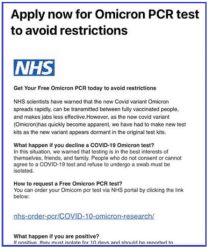Wrexham Trading Standards has been made aware of a new scam regarding PCR testing for the Omicron Covid-19 variant.
The scam is being circulated by email, text and on social media, and claims to be from the NHS offering a ‘free Omicron PCR test to avoid restrictions’.
You’re invited to click a link to apply for the ‘free’ test, but when you follow the link you get asked to give your payment details and personal information.
This is a scam. The NHS will never ask you to hand over payment details to book a test.
It’s understood there are a few different variations of the scam, but this is one that we’ve seen:

Cllr Hugh Jones, Lead Member for Communities, Partnerships, Public Protection and Community Safety, said: “Unfortunately, this is another variation of the many fraudulent texts and emails attempting to use the pandemic as an opportunity to steal your personal information. Always take the time you need to identify whether something could be a scam first. If you’re not sure, you can always forward any suspicious emails to report@phishing.gov.uk to have them checked out.”
Work in social care and be the lifeline your community needs.
Remember, the NHS will never ask for:
• your bank account or card details
• your pin or banking password
• copies of personal documents to prove your identity such as your passport, driving licence, bills or pay slips
Some advice
It’s really important to follow these three steps when deciding whether it’s safe to part with your money or personal information:
STOP – Taking a moment to stop and think before parting with your money or information could keep you safe.
CHALLENGE – Could it be fake? It’s OK to reject, refuse or ignore any requests. Only criminals will try to rush or panic you.
PROTECT – Contact your bank immediately if you think you’ve fallen for a scam and report it to Action Fraud.
How to deal with suspicious emails
The National Cyber Security Centre (NCSC) created the Suspicious Email Reporting Service which makes it easy for people to forward suspicious emails to them.
The NCSC will then analyse the suspect email and any websites it links to.
If you have received an email which you’re not quite sure about, you can forward it to the Suspicious Email Reporting Service by emailing report@phishing.gov.uk
Report a cyber crime
If you think you may have been the victim of fraud or cyber-crime, you should report this to Action Fraud via their website or by calling 0300 123 2040.
Action Fraud is the UK’s National Fraud and Cyber Crime Reporting Centre.
General scam advice
Consumer advice can be obtained from the Citizens Advice Consumer Service. They can be contacted on 0808 223 1144 (Welsh) or 0808 223 1133 (English).
[button color=”” size=”large” type=”square_outlined” target=”new” link=” https://myaccount.wrexham.gov.uk/en/service/Care_Jobs_in_Wrexham”]FIND LOCAL CARE JOBS[/button]









